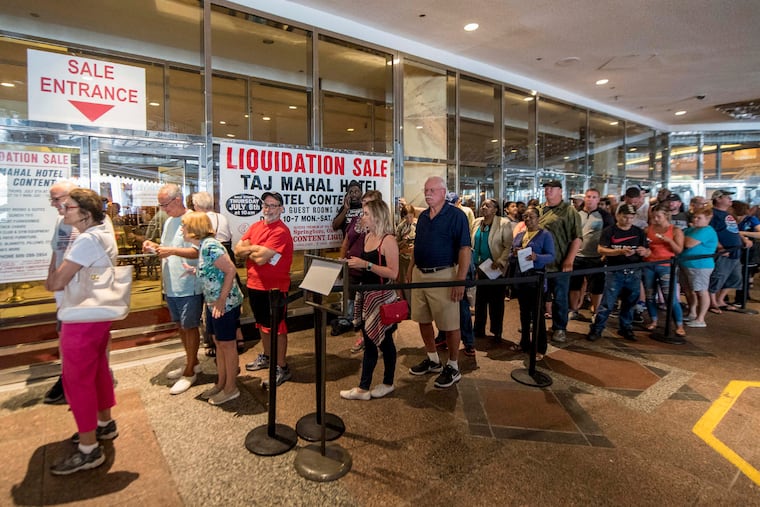Atlantic City is shocked — shocked! — over Trump’s tax revelations stemming from his casinos
“Trump was never honest about full disclosures, never honest about the risks involved in his businesses, and never honest about the assets behind him.”

After 25 years in Atlantic City and multiple bankruptcies that left behind a parade of unpaid casino creditors and investors, Donald Trump has nearly exhausted his ability to shock anyone in the Shore resort.
So it was not particularly startling to close observers in New Jersey when the New York Times reported Sunday that President Trump’s ongoing dispute with the federal government over a $72.9 million tax refund is likely linked to losses he claimed after his forced exit from the casino business in 2009.
“I guess we shouldn’t be surprised that he took that huge write-off,” said Bryant Simon, a Temple University professor and author of Boardwalk of Dreams: A History of Atlantic City. “We’ll find out soon if that write-off was legally dubious. But Trump was never honest about full disclosures, never honest about the risks involved in his businesses, and never honest about the assets behind him.”
The Times, disclosing details from more than a decade of Trump’s closely guarded tax returns, reported that Trump paid little to nothing in federal income taxes despite earning millions of dollars. The newspaper said that Trump paid no federal income taxes in 10 of the last 15 years, mostly because of reported heavy losses.
» READ MORE: Trump’s tax revelation could tarnish image that fueled rise
The president denounced the Times report but has declined to disclose his tax returns, saying he is engaged in an unresolved audit with the IRS.
Trump personally never declared bankruptcy, as he touted to supporters during the 2016 campaign. But his casinos did file, frequently.
The newspaper’s report said the tax dispute may center around the 2009 bankruptcy filing, when Trump filed a claim for more than $700 million in business losses that he had not been allowed to use in prior years. The material obtained by the Times did not identify the business that generated the losses, but they were of a kind that can be claimed only when partners give up their interest in a business.
In 2009, with his business in tatters under the weight of unsustainable debt, Trump parted with his namesake company, Trump Entertainment Resorts Inc., only weeks before it declared bankruptcy. Trump Entertainment owned the Trump Taj Mahal, Trump Plaza, and Trump Marina casino hotels in Atlantic City.
» READ MORE: The slow dismantling of the old Trump Plaza casino in Atlantic City has begun
Trump notified the U.S. Securities and Exchange Commission that he had “determined that his partnership interests are worthless and lack potential to regain value,” and was “hereby abandoning” his stake. The language was important, since a partner who walks away from a business with nothing can declare all the losses on the business that could not be used in prior years.
But Trump did receive something. In exchange for allowing the new owners to continue using his name on the properties, Trump received 5% of the company’s stock and warrants for another 5%. That ongoing ownership interest could prompt auditors to disallow Trump’s $72.9 million federal refund, and he would be forced to return that money with interest, the Times reported.
Trump is often credited with helping to relaunch Atlantic City, and his reputation as a showman attracted celebrities and top-flight boxing matches to the resort in the 1980s and 1990s. Trump is still widely admired by many of his former casino employees, with whom he had a rapport, said Daniel Heneghan, who covered the casinos for the Atlantic City Press before spending two decades as a spokesman for the Casino Control Commission.
“His antics certainly drew a lot of attention and created a lot of buzz,” said Heneghan. “Did that create a lot of business? Yes. But that got stale after a while.”
For investors and public officials who dealt with Trump, he is not missed. “He was obnoxious, to put it bluntly,” said Anthony Marino, a casino analyst who was an official with a local transportation agency and who dealt with the Trump Organization.
“His overall impact on Atlantic City for the first 10 years was probably positive,” said Marino. “But the last few years of his stay in Atlantic City, he really made no impact whatsoever other than as a blowhard that exaggerated everything that he was going to do, and left a lot of people bankrupt as a result.”
“He put a number of local contractors and suppliers out of business when he didn’t pay them,” Steven P. Perskie, New Jersey’s top casino regulator in the early 1990s, told the Times in 2016. “So when he left Atlantic City, it wasn’t, ‘Sorry to see you go.’ It was, ‘How fast can you get the hell out of here?’”
A Trump Atlantic City timeline
May 1984: Trump Plaza opens.
July 1985: A second casino, Trump Castle, opens. It was later renamed the Trump Marina.
April 1990: Trump opens the Taj Mahal, a 42-story, $1 billion casino-hotel, Atlantic City’s first mega-resort.
July 1991: Trump Taj Mahal files for Chapter 11 bankruptcy protection.
March 1992: Trump Plaza and Castle file prepackaged bankruptcy petitions to restructure their balance sheets.
Feb. 13, 2009: Trump resigns from the board of directors of Trump Entertainment Resorts Inc., which declares bankruptcy.
September 2014: The casino company again files for bankruptcy protection and Trump Plaza closes. Carl Icahn, who holds much of Trump Entertainment’s debt, gains control of it and the Taj Mahal.
July 2017: Hundreds of curious buyers line up for a liquidation sale at the Taj Mahal.
Staff writer Christian Hetrick contributed to this article.